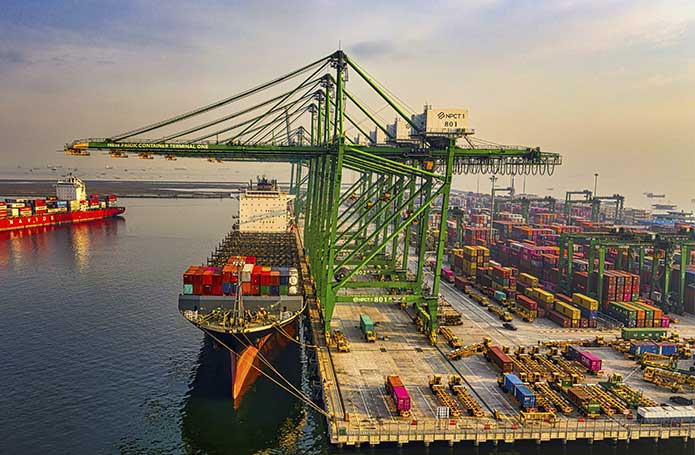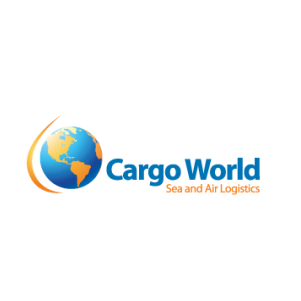Brazilian container exports have grown significantly over the past decade: the volume of containers shipped has risen at an annual rate of 4% between 2010 and 2019. In 2019, 40.4 million tonnes of containerized goods left Brazil toward international markets – 48% higher than in 2010 and close to what should be registered in 2020.
In the same period, real GDP grew by only 6%. The data are part of a survey carried out by the National Confederation of Industry (CNI) based on information from the National Waterway Transport Agency (Antaq).
The increase is related to the growing containerization of cargo from the agro-industry and products of lower added value, such as chilled meats, wood, paper and cellulose, coffee, sugars, cotton, grains, among others.
On the other hand, container imports brought mostly manufactured products, such as plastics and their products, chemicals, machinery and equipment and electronics.

The increase in the volume of exports in containers revealed an increasing concentration of trade flows in certain ports, routes, stopovers and shipping companies operating in the country.
Currently, six port terminals account for 81% of container shipments: Santos (whose share went from 42% to 36% over the last decade), Paranaguá (PR), Navegantes (SC), Rio Grande (RS), Itapoá (SC ) and Dp World Santos (with installments between 8% and 12%). São Paulo, Rio de Janeiro and the three southern states account for 90% of the exported volume.
The expansion of this concentration reflects the global process of mergers and alliances between container shipping companies, also underway in Brazil, with adverse consequences for exporting companies.
In addition to reduced competition on maritime routes, services have become less frequent, the network of ports of origin and destination of cargo along the routes has shrunk and, consequently, the possibilities of port-to-port connections have decreased.
In a decade, 12 shipping companies stopped operating in Brazil
The number of container transporters operating on long-haul routes in Brazilian ports dropped from 26, in 2010, to 14, in 2019. Today, the market is made up of eight of the nine largest transporters in the world and six smaller companies.
The number of weekly services operated by the group of shipowners also dropped significantly: from 109, the peak recorded in 2008 before the global crisis, to 66, in 2019. The reduction was concentrated among the eight large shipowners, which account for 55 of the services currently offered.
In addition, the period also registered the verticalization of operations, in which the same company operates the port and the ships. Currently, 19% of the containers shipped are concentrated in two private terminals associated with large shipowners – Navegantes (SC), under full control of MSC, and Itapoá (SC), in which Maersk holds 30% of the capital.

The effects of the pandemic and expectations for the coming years
The CNI survey points out that the Covid-19 pandemic caused a reduction in the number of ships and calls scheduled in Brazilian ports, especially on routes to Asia in the first months of last year.
As of the second half of 2020, companies expanded the offer of transport services to levels even above that seen before the pandemic, but without being able to absorb all the pent-up demand for goods, in Brazil and in the world.
As a consequence, freight prices have risen on almost all routes, directions and types of containers. The biggest increases occurred in the import of containers originating in Asia, where the average freight values more than quadrupled, going from an average of US $ 2 thousand per container in January 2020 to US $ 9 thousand in January 2021
“Cargo shippers around the world complain about the transfer of logistical costs by shipping companies, which highlights the need to reduce the market power exercised by shipowners, even with the return to operational normality after controlling the pandemic. ”, Says CNI Infrastructure specialist Matheus de Castro.
He adds that Normative Resolution No. 18/2017, a maritime regulation that led to greater balance in relations between operators and users of transport services, needs to be strengthened and widely disseminated.
According to the expert, a strategy adopted in several countries was the creation of councils that use container maritime transport, aiming to increase the bargaining power of exporters in negotiations with shipping companies.
“The national productive sector could count on a similar institution in the country. Other measures must be adopted to reduce the cost of foreign trade for the productive sector, such as, for example, the non-renewal of the market reserve agreements in maritime transport that Brazil has with Argentina and Uruguay ”, adds Matheus de Castro.
Source: Comex do Brasil / CNI







